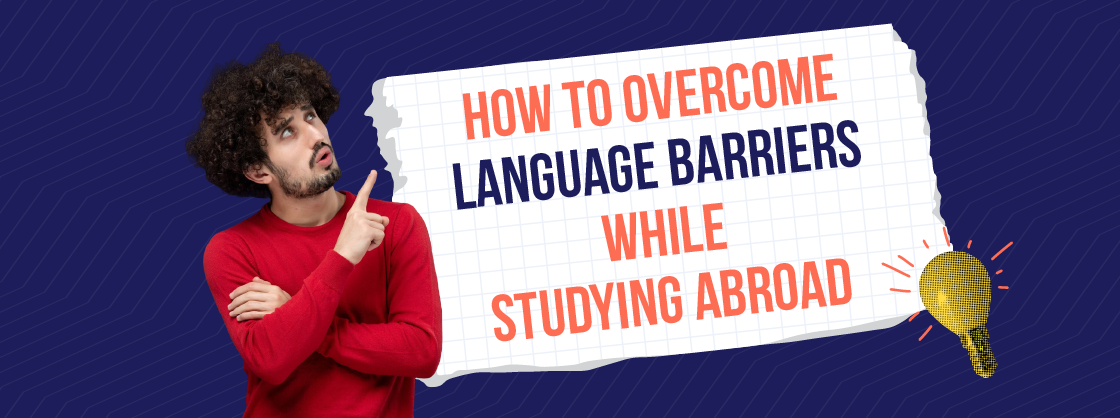How to Overcome Language Barriers While Studying Abroad?
Table of Contents
Studying abroad is one of the most rewarding experiences you can have as a student. It gives you a chance to immerse yourself in new cultures, gain world-class education, and meet people from diverse backgrounds. But let’s be honest: navigating a new country where everyone speaks a different language can feel overwhelming. That is why overcoming language barriers is not just about learning grammar or vocabulary; it’s about finding ways to connect, adapt, and thrive in your new environment. But don’t worry—you’re not alone in this, and there are many practical steps you can take to overcome these hurdles.
Here’s your international student guide packed with study abroad tips to help you break through language barriers and make the most of your journey.
Why Language Barriers Are a Big Deal for International Students?
Language barriers go beyond mispronouncing a few words—they can impact your:
- Academic Success: Imagine sitting in a lecture, eager to learn, but struggling to follow what the professor is saying. That’s how academic success can take a hit, with challenges in understanding lectures, participating in group discussions, or even completing assignments.
- Social Life: Outside the classroom, language hurdles can creep into your social life, making you feel like an outsider when you can’t fully engage in conversations with peers or locals. It’s that awkward silence or the laugh you miss out on because you didn’t catch the joke.
- Mental Well-being: Language barriers can start to take a toll on your mental well-being. The frustration of not being able to express yourself, the anxiety of making mistakes, or the pang of homesickness when you long for the comfort of your native language—it’s all connected.
A survey by the British Council revealed that 67% of international students cite language barriers as one of their primary difficulties. This makes it crucial to prioritize strategies for improving your communication skills from the start. With the right mindset and tools, you can overcome these challenges and turn them into steppingstones for growth. Let’s explore how!
1. Understand the Language Landscape Before You Leave
Your journey to mastering a new language begins before you even step foot in your host country. You can start by understanding the linguistic environment of your destination beforehand.
Key Steps to follow here are:
- Checking Language Requirements for Admission: Most universities require tests like IELTS, TOEFL, or Duolingo to assess your English proficiency.
- Learning Local Basics: If the academic language is English, but the local language is different (e.g., French, Spanish), learn common phrases for day-to-day use.
- Enrolling in Pre-Departure Courses: Online courses, community classes, or private tutoring sessions can help you build a solid foundation.
Below are the language proficiency tests and their minimum score that is required to study abroad:
| Language Proficiency Test | Minimum Score Required |
| IELTS | 6.0–7.5 |
| TOEFL | 80–110 |
| Duolingo | 105–130 |
2. Start Your Language Journey Early
Why wait until you’re in a foreign country to start learning the language? The sooner you begin learning the language, the better equipped you’ll be to communicate effectively. Below are the best language learning tools to improve your language speaking skills:
Best Language Learning Tools for 2025:
- Apps: Start by using apps like Duolingo, Rosetta Stone, or Babbel to build your vocabulary and practice daily phrases.
- Podcasts and Audiobooks: Listen to language-learning podcasts or audiobooks in your target language.
- Language Exchange Platforms: If you want a more structured approach, consider hiring a tutor through platforms like Tandem or HelloTalk. These one-on-one sessions with native speakers can help you fine-tune your speaking skills and gain insights into cultural context.
Pro Tip: Dedicate 30 minutes daily to learning basic phrases, such as greetings, asking for help, or directions. These small steps make a big difference when you arrive.
3. Use University Support Services
Once you’ve arrived, your university is one of the best resources to overcome language barriers. Most universities offer customized services to help international students adapt to a new academic and cultural environment. Don’t hesitate to take advantage of them.
Essential University Resources to Help You Learn a New Language:
- Language Classes: Many universities offer beginner or intermediate courses for international students.
- Academic Writing Workshops: Improve your essay and research paper writing skills.
- Conversation Clubs: Practice casual conversations with fellow students and locals in a relaxed setting.
Study Abroad Tip: Check with your university’s international student guide to find out about available language resources.
4. Immerse Yourself in the Local Culture
Immersion is one of the fastest ways to overcome language barriers. By actively engaging in the culture, you’ll learn the language in its most authentic form.
Ways to Immerse Yourself:
- Participate in Local Events: Join festivals, cultural activities, or workshops in your area.
- Live with Native Speakers: Opt for shared housing with locals to improve your conversational skills daily.
- Explore the City: Use public transport, visit local markets, and interact with shopkeepers to practice your skills.
Immersion isn’t just about language—it’s about building confidence and understanding the culture around you.
5. Build Confidence Through Practice
The biggest barrier to communication is often the fear of making mistakes. Remember, it’s okay to stumble—what matters is your effort.
Top 3 Tips to Build Confidence:
- Speak Daily: Practice with your classmates, roommates, or even friendly locals.
- Record Yourself: Play back recordings to identify areas for improvement.
- Engage in Role-Playing: Simulate real-life situations like ordering food, asking for directions, or shopping.
Fun Fact: Research shows that students who practice speaking for just 15 minutes a day improve their fluency by 30% faster.
6. Use Technology to Break Barriers
Technology can be your best friend when you’re trying to adapt to a new language. There’s an app or tool for almost every aspect of language learning.
Essential Tools to Overcome Language Barriers:
- Translation Apps: Use Google Translate or DeepL for quick translations on the go.
- Grammar Checkers: Grammarly and ProWritingAid are great for academic assignments.
- Vocabulary Builders: Tools like Anki or Quizlet help you memorize new words faster.
7. Choose Accommodation That Supports Language Learning
Where you live can significantly impact your language learning journey. Living with locals or in student communities can accelerate your progress.
Top 3 Accommodation Tips for students studying abroad:
- Live with Locals: Shared apartments or homestays offer daily opportunities to practice speaking.
- International Student Housing: Look for accommodation that hosts cultural exchange events or language workshops.
- Community Vibes: Options like those offered by University Living connect you with a vibrant, student-friendly environment.
8. Stay Motivated and Patient
Overcoming language barriers takes time, effort, and patience. Celebrate small wins and remind yourself why you started. You can do so by:
- Setting Realistic Goals: Break your language learning journey into achievable milestones.
- Tracking Your Progress: Keep a journal of new words, phrases, or interactions.
- Celebrating Success: Treat yourself whenever you master a new skill or complete a challenging task.
Did You Know? Students who actively engage in language learning report higher levels of satisfaction with their study abroad experience, according to the British Council.
Conclusion
Overcoming language barriers while studying abroad is a journey of growth and discovery. By preparing early, immersing yourself in the local culture, and leveraging the right tools and resources, you’ll find yourself speaking with confidence in no time. Remember, every effort you make brings you closer to fluency—and a richer, more rewarding study abroad experience.
Need help finding a supportive community to kickstart your journey? Start by finding the perfect accommodation with University Living, where you can connect with a supportive community and make the most of your study abroad experience. Let’s turn those language barriers into stepping stones!
Frequently Asked Questions
What are the best ways to overcome language barriers as an international student?
The best ways to overcome language barriers include taking language courses, using apps like Duolingo, practicing with native speakers, and immersing yourself in the local culture through events and interactions.
How can I improve my language skills before studying abroad?
To improve your language skill, start with language learning apps, enroll in pre-departure courses, watch movies or listen to podcasts in the target language, and practice with online tutors.
Can universities help international students overcome language barriers?
Yes, most universities offer support like language classes, conversation clubs, writing workshops, and academic tutoring specifically for international students.
How can I build confidence in speaking a new language?
To build your confidence, practice daily with peers, record yourself to identify areas of improvement, and engage in role-playing scenarios like ordering food or asking for directions.
What tools can I use to overcome communication challenges abroad?
You can use translation apps (e.g., Google Translate), vocabulary builders (e.g., Quizlet), grammar checkers (e.g., Grammarly), and language exchange platforms (e.g., Tandem).







